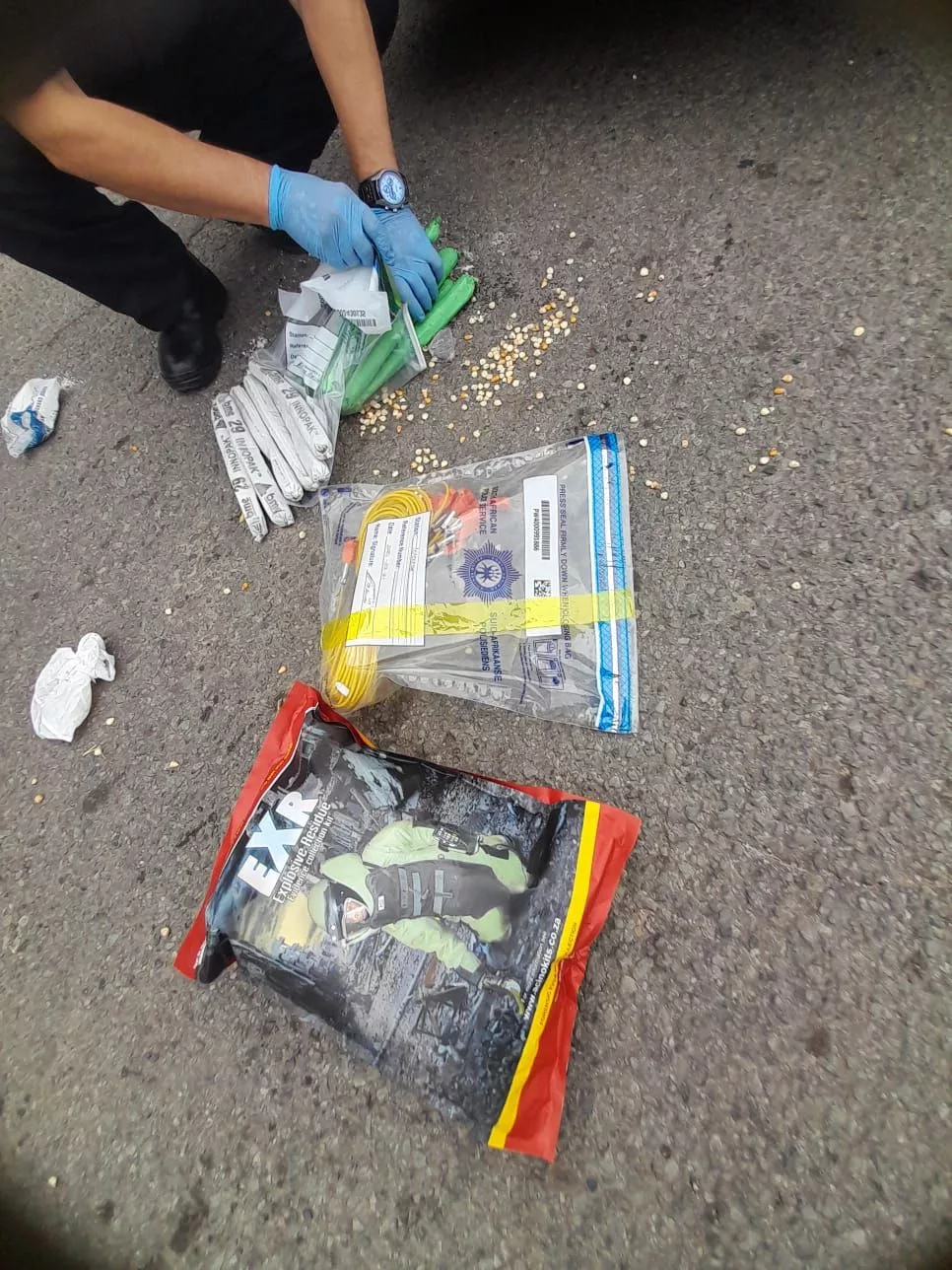A dangerous syndicate supplying illicit explosives to criminals in South Africa was recently dismantled by law enforcement agencies. The syndicate’s activities contributed to an upsurge in Cash-In-Transit heists, illegal mining, and ATM bombings. The arrest marks a significant victory in the ongoing fight against crime and demonstrates the commitment of South African law enforcement to bring criminals to justice. Despite formidable charges, the syndicate’s capture serves as a beacon of hope for the nation’s safety and security.
South Africa recently experienced a major relief, following the capture of a formidable syndicate that had been brazenly supplying illicit explosives to nefarious entities. The syndicate’s operations significantly contributed to the upsurge in Cash-In-Transit (CIT) armed heists, illicit mining, and ATM bombings. Their arrest marks a significant victory in the ongoing war against criminal activities, demonstrating the commitment of South African law enforcement agencies to bring malefactors to justice.
The Syndicate’s Reign of Terror
South Africa recently experienced a major relief, following the capture of a formidable syndicate that had been brazenly supplying illicit explosives to nefarious entities. The syndicate’s operations significantly contributed to the upsurge in Cash-In-Transit (CIT) armed heists, illicit mining, and ATM bombings. The arrest marks a significant victory in the ongoing war against criminal activities, demonstrating the commitment of South African law enforcement agencies to bring malefactors to justice.
This syndicate, comprising three men and a woman, was finally cornered in Welkom, Free State. Their arrest was masterfully executed by the South African Police Service (SAPS) EC Crime Intelligence, SAPS Free State Explosives section, and members of the National Intervention Unit (NIU) from Pretoria. Their capture on a typical Wednesday afternoon set off a shockwave that resonated beyond the ordinary.
These notorious offenders left a trail of destruction in their wake, spearheading numerous crimes where explosives were a lethal ingredient. They targeted regions such as the Free State, Eastern Cape, North West, and Gauteng, where ATM bombings, CIT heists, and illegal mining activities ran rampant. The depth of their involvement casts a spotlight on the cold-blooded operations of criminal syndicates.
Capture and Seizure
At the time of arrest, law enforcement officials discovered 40 explosives and various explosive accessories in the syndicate’s possession. This discovery underscores the serious threat such illicit activities pose to societal peace and security. Nonetheless, the arrest also highlights the vigilance and proactive response of the police force.
The operation against this syndicate forms part of OPERATION SHANELA, a wider campaign targeting the illegal possession and usage of explosives. Since its initiation in May 2023, this operation has yielded impressive results, seizing 11,481 explosives in roadblocks, tracing operations, and stop and search operations. In the same period, it has also led to the arrest of 173 suspects implicated in the illegal possession of explosives.
Legal Proceedings and Implications
In spite of the significant victory symbolized by their arrest, the syndicate members face formidable charges. They are slated to appear before the Welkom Magistrate’s Court on Friday, 23 February 2024. The charges are related to violations of the Explosives Act 26 of 1956, a law that imposes stringent penalties for contraventions.
The capture of this syndicate quartet is a testament to the unyielding determination and diligence of South African authorities. Their arrest not only brings a cessation to a series of criminal activities but also serves as a deterrent to other potential lawbreakers. With the suspects awaiting their court appearance, the message is unequivocal – crime, in all its manifestations, will not be condoned.
The Broader Picture
The syndicate’s capture is as much a triumph for the law enforcement agencies as it is for the average citizen. It offers reassurance that the guardians of law and order remain tirelessly vigilant, countering the murky criminal undercurrent that threatens societal equilibrium. Even amidst the turbulence and disorder, the rule of law stands as a beacon of hope, shining resplendently.
The syndicate’s capture serves as a significant landmark, but the greater narrative lies in the unswerving pursuit of justice. Behind the scenes, the relentless efforts, commitment to eliminate crime, and dedication to uphold the law by the police force often remain unseen. Even with the echoes of this operation fading, their unwavering vigilance perseveres, safeguarding the safety and security of the nation.
In summary, the syndicate’s narrative illuminates the sinister underbelly of crime, the audacity of criminals, and the indomitable spirit of those that combat them. It’s a tale that underscores the supremacy of law over lawlessness, justice over injustice, and most importantly, the victory of good over evil.
1. What criminal activities did the syndicate contribute to?
The syndicate contributed to Cash-In-Transit heists, illegal mining, and ATM bombings.
2. How was the syndicate captured?
The syndicate was captured by the South African Police Service (SAPS) EC Crime Intelligence, SAPS Free State Explosives section, and members of the National Intervention Unit (NIU) from Pretoria.
3. What was discovered at the time of arrest?
At the time of arrest, law enforcement officials discovered 40 explosives and various explosive accessories in the syndicate’s possession.
4. What wider campaign was the operation part of?
The operation against this syndicate was part of OPERATION SHANELA, a wider campaign targeting the illegal possession and usage of explosives.
5. What legal proceedings and charges do the syndicate members face?
The syndicate members face formidable charges related to violations of the Explosives Act 26 of 1956 and are slated to appear before the Welkom Magistrate’s Court.
6. What is the broader significance of the syndicate’s capture?
The syndicate’s capture serves as a significant landmark and offers reassurance that law enforcement agencies remain tirelessly vigilant, countering the murky criminal undercurrent that threatens societal equilibrium.












